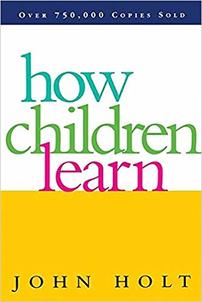 I recently finished a classic in child development: How Children Learn by John Holt. It reminded me a lot of Richard Feynman's writing, like Surely You're Joking Mr. Feynman!, because it was written as a collection of observations, stories, and lessons learned in very straightforward language. I loved the references to typewriters (which sound like really good objects for kids to explore) and other somewhat dated/classic items. It seems like he was one of the first proponents of the natural abilities and curiosities of kids and giving them the opportunity to lead their own educational explorations. I can see how a lot of other more recent parenting authors have built upon his foundations. My full notes on the book are below. Preface
Follows how children fail Trust children Trust yourself Watching children learn Games and experiments Better to let kids improvise Keep around objects in household kids can touch Small kids just start and try even if get wrong immediately and then fix by repeated trials. Older kids wait and use mind to make sure right on first attempt. Lose willingness to just try and improvise. Instinct for workmanship. Not about just being done but to do as well as can or for personal enjoyment of the process. Inventing games Practice doing it wrong for fun Diary entries of watching kids learn Doing things for sake of doing Patient and persistent experiment to learn speech Not being afraid of sounding or being wrong Successive approximations In time kids work out correct speech themselves without anyone correcting them Stop correcting kids mistakes. They will figure it out. Kids as intelligent from early age and to be respected. Don’t make kids realize how little they know or how much u know or what u can do Don’t check up on what kids learned. Stop testing them Let kids detect and fix own mistakes. Find out for self if correct. Don’t create dependence on teachers. Read books too complex for kids so can learn from them also Signs around house with words naming objects and places Don’t make a fuss over timetables for reading or learning progress Sports Don’t force if afraid Art and math Use real paints and tools Unstructured explrations with things Keep curiosity well supplied with good materials Fantasy Fantasy allows understanding of real world To test reality Don’t force trying to fantasize Kids ok with not having all answers Learning and love References Growing without schooling How children fail
0 Comments
Your comment will be posted after it is approved.
Leave a Reply. |
Archives
June 2024
Categories
All
Subscribe |
 RSS Feed
RSS Feed
